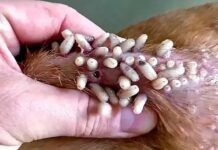You’ve probably met up more than once with a friend or dog-loving acquaintance and had the classic conversation about whether or not to neuter a dog. There are dozens of urban legends and senseless rumors about the effects of spaying and neutering in dogs. Most of these rumors and urban legends, if not all, are completely unfounded and are erroneous or false.
We all love our pets and it hurts us to know that they have to go through an operation to be neutered or sterilized. Therefore we will explain step by step what the benefits and drawbacks of neutering our furry friends are, what changes they will experience in personality and metabolism and how it will affect us, too. We will review everything that involves neutering our furry companion in depth, so you won’t want to miss this!
What is neutering and what is sterilization in dogs?
Neutering is the removal of the testicles and scrotum in male dogs and removal of the ovaries and uterus in female dogs (spaying). Sterilization is very similar to a vasectomy in humans, nothing is removed but permanent measures are taken to keep the male or female dog from reproducing using duct ligation.
Without a doubt, we recommend spaying/neutering directly, given its many benefits over simple sterilization, even though the surgery is more complex in neutering (but isn’t dangerous; it’s a very common operation without significant risks).
When should you neuter a dog?
There are many opinions regarding this question, obviously each of them more “personal” than “professional”. The only certainty, as it is scientifically proven, is that the best age to spay/neuter both males and females is between six and eight months of age.
At this age, the testicles in males have not yet developed the hormones that lead the dog towards certain sexual and territorial tendencies, what we know as testosterone. It is very important to have your dog neutered before he starts to produce testosterone and the best age for it is between six and eight months.
There are a thousand rumors regarding females… “you have to wait for her first heat to pass”, “you have to wait for her to be mounted”, “it’s better when she has a litter”… Ignore all of these rumors and opinions from inexperienced people. As with males, the best age to spay a female is six to eight months.
Why is it a good idea to neuter my dog?
Ask yourself the following questions: *Are you a breeder?* Would you mind having eight puppies at home? I think you know the answer now. If you don’t dedicate yourself professionally to dog breeding, why would you want your dog to be able to reproduce? There are millions of dogs in the world, and thousands of them are put down every day in kennels because they don’t have a home. Do you want your dog to reproduce? What will you do with the puppies? Let’s cut the nonsense and think clearly; no more dogs are needed in the world.
The only reason not to neuter a dog is if you want him or her to reproduce and is therefore only appropriate for people who dedicate themselves to it on a small scale. You just have to walk through a kennel or animal shelter to see the hundreds of dogs that need homes. Don’t allow your dog to reproduce and contribute to the problem by creating even more homeless dogs; it’s not fair to them or to you.
Yes, and absolutely yes – you should neuter your dog. Moreover, we hope that someday a decent animal protection law is written (the current ones are garbage) where compulsory spaying/neutering is included.
If I decide to neuter my dog, is it going to hurt him?
No, spaying and neutering are always done under anesthesia so the dog doesn’t feel anything. It is true that when they wake up, they may have some discomfort, something completely normal and common in any type of operation (both in dogs and humans). Veterinarians administer mild sedatives, anti-inflammatories and antibiotics so that their recovery is quick and painless.
It’s such a simple operation that usually the same day or the next, the dog can go out for a walk and go about his normal life, taking care not to damage the operated area, obviously, since the stitches are still in. Some dogs will need to wear an Elizabethan collar (aka cone) for a few days so they can’t lick the stitches, while others won’t need anything.
Today when neutering a male there are two options, finishing with external sutures (visible stitches) or internal sutures (internal dissolving stitches). We definitely recommend the second option, which is to doing the stitches internally so the dog usually won’t have to wear a cone.
What are the benefits of neutering a dog?
Many more than you would think, although males and females are somewhat different, so we have a brief summary here so you can see all the benefits:
Benefits of neutering a male dog:
- The dog will be less territorial and dominant, a great benefit for both him and you.
- His behavior will be less aggressive, especially when he is with other dogs as he won’t fight to show dominance.
- The dog will have less desire to run away (especially when females are in heat, which is when they usually try to escape).
- A very significant reduction in the possibility of developing tumors and infections in the testicles, penis and prostate.
- Your dog will have better health because his immune system won’t weaken as a result of stress with females in heat.
- You will have a quieter and less nervous dog.
Benefits of spaying a female dog:
- She will no longer experience the hormonal changes that make her so nervous, sad and whiney.
- You prevent the possible formation of ovarian, uterine and breast cancer, dramatically reducing the chances of developing these cancers.
- She won’t look to be mounted by males.
- She won’t have false pregnancies or related complications.
- She won’t cause stains as a result of menstruation.
- You avoid having to abandon unwanted litters (puppies).
- You prevent her from urinating to mark her territory.
- She avoids the stress experienced when in heat and mating season.
Benefits of neutering in males and females:
- Neutered dogs are usually much more loving and friendly.
- Neutered dogs are not as dominant as unneutered dogs and, of course, are much less aggressive.
- Neutered dogs can have sex with no problem, with the benefit of not winding up with a pregnancy.
- Neutered dogs don’t suffer because they have been spayed or neutered; in fact, they usually have a happier and more peaceful life.
Will my dog get fat if I neuter him?
No, spaying or neutering your dog is not directly related to their weight. However, it is true that neutered dogs are less territorial and therefore less nervous. That is, these dogs are calmer so you have to make sure they don’t consume excess food and try to give them the exercise they need (as you would with unneutered dogs).
It’s a common misconception that the dog will get fat after being neutered, assuming you neuter your dog at the appropriate time, that is, between six and eight months. Remember that when he turns one year old, you’ll have to change dog food to one with less energy value (calories).
Dogs one year old or older don’t need dog food that is so complex since they are no longer puppies. Their levels of growth and energy normalize and thus we must also normalize the amount of calories we give them. A natural dog food for adult dogs in the right amount and exercise is normal for a dog to be healthy and not get fat.
Because neutering is often done at around one year of age (although it is advisable to do it before them), people associate their dog’s weight gain with the fact that he or she has been sterilized, but they are not directly related.
How long will it take for my dog to recover from neutering?
Normally, males are completely fine after one or two weeks, same for females, as long as everything goes well, we administer the appropriate medications and no rare complications arise such as infections or the like.
How much does it cost to neuter a dog in the USA?
The prices are very uneven, as it depends on the weight of your dog and the area where you live. In New York City, for example, spaying or neutering can cost $5 with proof of public assistance, or at a normal clinic for dogs less than 60 lbs the cost to neuter a male is approximately $45-$135, neutering a female costs a little more. In Canada it’s approximately $100 CAD and in the UK the cost can run from around £100 to £300 unless you are receiving means-tested benefits and live in certain areas, which entitles you to a discounted rate.
The price may vary a lot as the amount of anesthesia needed varies depending on the type and weight of the dog. The same thing happens with medications that they need to take after the operation and the price of veterinarian (price charged for the operation).
There are places where it’s practically free; see your nearest Humane Society or town hall (sometimes they have campaigns to spay and neuter at very, very low prices).
If I neuter my dog, will he be calmer?
Possibly, but don’t go thinking that after neutering he will be a sea of calm. It usually takes six months to a year to notice the effects of neutering if the dog is more than six months old. This is because the body must eliminate the testosterone that the testicles have already created; the same is true with females, who produce a whole bunch of hormones.
If your dog is older, just don’t neuter him. Dogs older than 5 years don’t respond the same way as young dogs; they don’t stop being territorial or aggressive as they already have an excess of testosterone. Usually, adult dogs are only neutered to prevent them from reproducing and to prevent tumors.
Does neutering a dog have any negative effects?
No, it has absolutely no negative effects.





